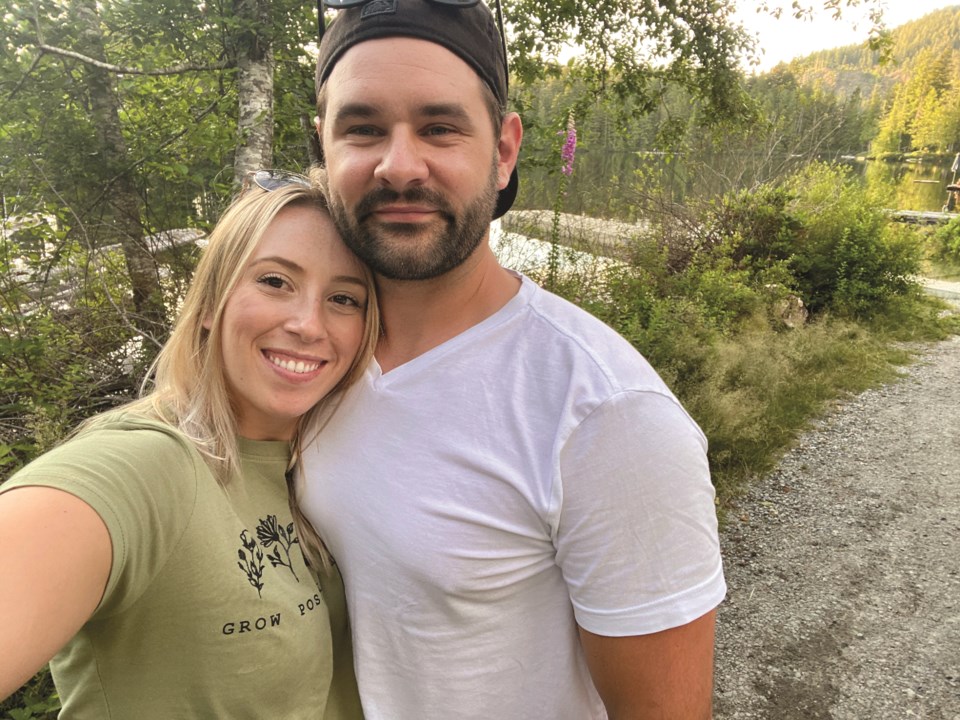In the span of just over a year, everything has changed for Jessica Taschner.
On June 27 last year, Taschner and her partner Steve LaTorre were accidentally poisoned by carbon monoxide while visiting a family cabin on Ruby Lake.
The couple, who were both 29 years old, were found unresponsive after telling friends and family they felt ill and had been vomiting. They had arrived only two days before Taschner was flown to the hospital in critical condition. LaTorre died at the scene.
Even though Taschner was a nurse at the time, working in the newborn intensive care unit of BC Children’s Hospital, she didn’t know the signs of carbon monoxide poisoning. Now she wants to help raise awareness about the danger of the odourless, colourless and tasteless gas.
“I just don’t want what happened to me to happen to someone else and have to go through learning how to do everything again, while grieving my life partner,” Taschner told Coast Reporter. “I don’t think anybody should lose someone they love over something that is so preventable.”
The couple had arrived on Thursday evening, put their boat away and opened the cabin up. They had been the only ones there about four weeks prior, the first time it was used that year since the pandemic began. By the next morning, Taschner was feeling unwell. She had a headache, and doesn’t remember texting a friend. She doesn’t have many memories from that morning or the following day, but recalls fainting. By evening, they were both throwing up.
“I still thought we had food poisoning but then that’s what carbon monoxide does to you, it makes you not think rationally. So, I don’t think my critical thinking skills were there at that point,” she said.
Friends in neighbouring cabins checked in on the couple, and one said Taschner was able to stand and have a conversation. That night, she remembers crawling on the floor, feeling too dizzy and sick to stand. LaTorre couldn’t get out of bed. The next thing Taschner knew, she was waking up in the hospital.
Two months after the incident, the report from Technical Safety BC’s investigation pointed to an improperly installed propane refrigerator as the main source of the carbon monoxide. It had been installed in 2010 and was not certified for use in Canada, according to the report.
The cabin was built in the 1950s and can only be accessed by water or a rough dirt road. It did not have a carbon monoxide detector.
Now Taschner and Technical Safety BC are getting the word out about the dangers of carbon monoxide poisoning ahead of the B.C. Day long weekend, when many people will be visiting rural recreational locations.
Taschner said the symptoms of carbon monoxide poisoning can be so vague that they can appear to be the flu, food poisoning or a hangover. Common symptoms people should be aware of are nausea, headache, confusion, dizziness, chest pains, weakness and vomiting.
Technical Safety BC recommends checking common sources of carbon monoxide, such as fuel-burning appliances and exhaust from recreational vehicles. Carbon monoxide detectors can be brought with you, if you’re unsure if there is one on location. They can be battery operated and portable.
If you have concerns about someone’s health and safety, you should wake them up to assess their condition. If you believe you or someone else are being poisoned by carbon monoxide, turn the appliances off, get everyone (including pets) outside, call 911 and seek immediate medical attention.
“I just feel that it's my duty and honour to Steve’s life and legacy to spread awareness about carbon monoxide poisoning,” Taschner said. “So that other young life is not lost over something so preventable.”
When Taschner woke up at Vancouver General Hospital, she could not move her limbs. She was intubated, but couldn’t talk until about mid-July. Movement slowly returned, limb by limb. Her family and friends helped by feeding her until she could do it on her own. She had to wear diapers until she became continent again. At the end of August, she began to walk again with help. By Thanksgiving, she was able to move back in with her parents in Burnaby.
Her sentences were short, and out of worry that she would seem blunt or mad when she spoke, Taschner decided to go to speech therapy. Between 29 and 30 years old, Taschner had to learn how to speak, bathe, use the washroom and walk again. She was often too tired to go down and up the stairs more than once a day, and can’t socialize like she used to.
These days, Taschner still attends physio. In the fall, she’ll be assessed to see if she can gradually begin to return to work and will likely begin vocational rehab. It’s been a lot of work to get to this point and recovery is an ongoing process. Taschner now has a dog, who she walks regularly as she rebuilds her tolerance and stamina.
“Do I want to go back to work? Yes. But am I ready? No,” Taschner said, adding she misses her patients, her colleagues and “feeling like I have purpose.”
As for Steve, Taschner hopes people remember her partner as someone who lived life to the fullest.
“He was a person that would just want everybody to have fun and have a good time, because that’s just how he was,” she said. “And I think it's really important for people to remember that, even though this terrible thing happened to him, I know in my heart that he would want us to move forward.
“I just feel like it’s my honour to him to continue on living and just get better and get back to everything that made me me. So that’s what I’m trying to do.”



